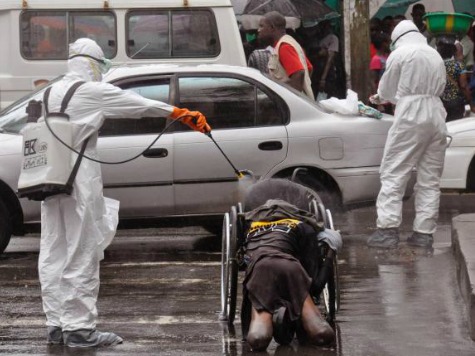Medical worker Pierre Trbovic helped run an Ebola clinic in Liberia. Specifically, he helped keep patients out, as the facility was far too small to harbor the number of patients storming in. In a column for The Guardian, Trbovic attempts to explain the feeling of turning Ebola patients away.
Trbovic worked for the Médecins Sans Frontières clinic in Monrovia, standing in front of an ad-hoc medical care tent for three days in the pouring rain to tell patients no. From The Guardian:
The first person I had to turn away was a father who had brought his sick daughter in the trunk of his car. He was an educated man, and he pleaded with me to take his teenage daughter, saying that while he knew we couldn’t save her life, at least we could save the rest of his family from her. At that point I had to go behind one of the tents to cry. I wasn’t ashamed of my tears but I knew I had to stay strong for my colleagues – if we all started crying, we’d be in trouble.
Others abandoned their loved ones in front of the tent. The family of one girl who doctors turned away left her at the gate where she later died. Her body remained there until a medical team was free to remove it. Another mother placed her baby in a chair in the facility hoping the doctors “would have no choice but to care for the child.”
It takes a lot of effort to prepare any worker to handle an Ebola patient. Trbovic said it takes 15 minutes just to put on the proper gear. Even with the gear, a doctor can only stay for an hour while others are needed to constantly clean the “human excrement, blood and vomit, and to remove the dead bodies.”
The treatment center will expand, but not soon enough. Since shortly after the outbreak began in February, MSF, the World Health Organization, and other organizations in West Africa have demanded more help. Trbovic said MSF’s president “called on states with biohazard response capability to urgently send teams to west Africa.” He claimed the patients and medical organizations could not just rely on the United Nations and NGOs for help. He said Monrovia needs more than 1,000 beds. The United States sent sixteen tons of medical equipment to Liberia in late August, but it only included gloves, masks, and body suits. On Monday, officials from the US and Britain said troops and equipment will be sent to Monrovia. The US will include 25 beds and Britain will send 65 beds.
Trbovic’s colleagues forced him to stop his job because of the emotional toll. But the day did not end on a sour note:
Whenever people recover, we have a small ceremony for the patients who are discharged.
Seeing the staff gather to celebrate this exceptional moment, hearing the words of the discharged patients as they thank us for what we did, gives us all a good reason to be there. Looking around I saw tears in all of my colleagues’ eyes. Sometimes there are good reasons to cry.

COMMENTS
Please let us know if you're having issues with commenting.